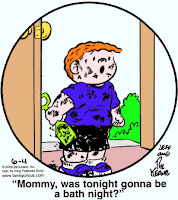 This cartoon is hilarious because a fish stick is a processed food product that does not, in fact, resemble any living fish.
This cartoon is hilarious because a fish stick is a processed food product that does not, in fact, resemble any living fish.Much like Jeffy is a processed cartoon stereotype that does not, in fact, resemble any living child.
Maybe Tolstoy started this way.
 No, children, don't cry. The grotesque parrot-creature in the window only looks that way cause Marmaduke's so darn big!
No, children, don't cry. The grotesque parrot-creature in the window only looks that way cause Marmaduke's so darn big!
 While the poor artwork in Marmaduke and The Family Circus provides ample ammunition for mockery, it doesn't really prevent their authors from telling the kind of stories they want to tell, mostly because the stories they want to tell are so simple. The less than laudable artwork in Pearls Before Swine and xkcd, meanwhile, is actually something of a feature; it's interesting, and often humorous, to see what Pastis and Munroe can do within their artistic limitations. The drawing in Arlo and Janis, though, is a real hindrance.
While the poor artwork in Marmaduke and The Family Circus provides ample ammunition for mockery, it doesn't really prevent their authors from telling the kind of stories they want to tell, mostly because the stories they want to tell are so simple. The less than laudable artwork in Pearls Before Swine and xkcd, meanwhile, is actually something of a feature; it's interesting, and often humorous, to see what Pastis and Munroe can do within their artistic limitations. The drawing in Arlo and Janis, though, is a real hindrance. Oh, kids, don't be freaked out by Dottie's frighteningly skeletal fingers. They're only like that cause Marmaduke's so darn big!
Oh, kids, don't be freaked out by Dottie's frighteningly skeletal fingers. They're only like that cause Marmaduke's so darn big!
 This cartoon is hilarious because Jeffy has finally snapped. Having already killed his siblings and buried them in the back yard, he is now luring his unsuspecting mother to the doorway. Don't go to him, Thel! Don't do it!
This cartoon is hilarious because Jeffy has finally snapped. Having already killed his siblings and buried them in the back yard, he is now luring his unsuspecting mother to the doorway. Don't go to him, Thel! Don't do it!
 Ziggy's lying, of course. He spouts bland populist talking points all the time, just like the characters in Pluggers and Shoe and The Family Circus. And that's fine! Cartoonists have every right to express their opinions. It would be nice, though, if they would acknowledge what they're doing.
Ziggy's lying, of course. He spouts bland populist talking points all the time, just like the characters in Pluggers and Shoe and The Family Circus. And that's fine! Cartoonists have every right to express their opinions. It would be nice, though, if they would acknowledge what they're doing. I take my enjoyment of his comic to mean that what the comics section needs is more Doris Kearns Goodwin and less gratuitous squirrel butt.
I take my enjoyment of his comic to mean that what the comics section needs is more Doris Kearns Goodwin and less gratuitous squirrel butt.


 While single-panel cartoons tend to work by accentuating the absurd, it is nevertheless necessary for them to have a certain internal logic. Take Sunday's Rubes, for example. The premise of the cartoon is the old adage that a man's home is his castle. Taken to absurd literalness, it makes perfect sense within the world of the comic that homes would therefore come under siege from Hagar the Horrible like raiders. It's ridiculous, but the joke flows naturally from the premise.
While single-panel cartoons tend to work by accentuating the absurd, it is nevertheless necessary for them to have a certain internal logic. Take Sunday's Rubes, for example. The premise of the cartoon is the old adage that a man's home is his castle. Taken to absurd literalness, it makes perfect sense within the world of the comic that homes would therefore come under siege from Hagar the Horrible like raiders. It's ridiculous, but the joke flows naturally from the premise.